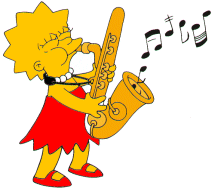
Sax It Up
Think fast, and no the answer is not guitar, bass and drums. What instrument do all the following bands have in common? Colin James, the Sam Roberts Band, Chris de Burgh, Dave Matthews Band, The Pogues, Nathaniel Rateliffe and the Night Sweats, Bruce Springsteen, and the Brian Setzer Orchestra. And, to an extent, the Arcade Fire, Dire Straits and Saint Motel. And the unmatchable David Bowie. And this is just off the top of my head; I’ve barely scratched the surface of this great iceberg of bands and musicians that use this instrument.
Sometimes the official band lineup doesn’t even include a signed-on player for one of these instruments, but session players and touring musicians help infuse their music with its sound. In the case of Bowie, it was the first instrument he learned how to play (albeit a white plastic version) and continued to use in all phases of his music, from Ziggy Stardust on through the 80s version of the Thin White Duke, all the way up to his guest vocals on Arcade Fire’s Reflektor and the grand finale of Blackstar. I’m talking about the saxophone.
According to Wiki, and a Google meme, we have Belgian musician and inventor Adolphe Sax to thank. Sax wanted to create a group or series of instruments that would be ‘the most powerful and vocal of the woodwinds, and the most adaptive of the brass instruments, that would fill the vacant middle ground between the two sections. He patented the saxophone on June 28, 1846.’
That oddly shaped, almost primeval outcross of brass and woodwind is one of those instruments that literally is as good as having another vocalist. It carries the power it was designed to do and its versatility in terms of musical genres in which it is a staple – jazz, R&B, rockabilly, jive, funk, soul, and by sheer dint of these genres’ influence, rock and many of its spinoffs, make it an increasingly popular instrument to play. It’s musical mortar, filling in all those little gaps in a way that no other instrument can.
No longer a band-geek staple, sax players say it’s easy to play, but difficult to master; its complexity demands discipline. They cite its versatility, the limitless sounds, the fact that being able to play sax well means other musicians want to play with you. It looks cool, it’s hip, and it demands soul – when was the last time you saw a sax player standing still? And, for whatever reason, women find the sax…sexy. On Twitter, Saint Motel make no secret of the fact that ‘Chicks love our sax player Matt!’ Uhm guys, maybe you should add him to the permanent lineup?
I’m sure that I’m not the only person who takes note when they hear a sax riff in a song by a new artist. Brian Setzer Orchestra’s has 5 sax players and you have no problem hearing their influence, and seeing that band live is a blast. Saint Motel’s epic My Type opens with one sassy sax and handclaps. That sax almost steals the song by keeping the beat throughout with the drum as the rest of the song swirls around it like bubbles in champagne. Ditto the giddily euphoric sax on Colin James’ Five Long Years; it immediately sets the tone for the rest of the song. It can also be subtle, though present, as it often is in the Dave Matthews Band.
Don’t stop there. Clarence Clemons’ sax work plays off beautifully as a foil for Springsteen’s voice. I think it no accident that the only Lady Gaga song I can bear to listen to in its entirety is ‘Edge of Glory’…the only song of hers that calls for sax, and again Mr Clemons fills the bill perfectly. I’ve always found the music of Madonna and most top-40 artists on more commercial stations to be musically shallow, lacking in depth, tinny. Probably because the sax is rarely used. And sad to say, much as I liked grunge, very few grunge bands had a sax player. Could that be partially responsible for the relatively short reign of grunge?
Back to my original list of musicians. The sax work on Dire Straits songs – where would Mark Knopfler be without a sax to accentuate his gruff voice and bluesy lyrics? Nathaniel Rateliffe and the Night Sweats have a very Pogues-like sound, in no small part to the sax. Jem Finer of the Pogues was the band’s multi-instrumentalist, and he played alto and tenor sax beautifully. If you want to hear what I’m talking about, youtube ‘Summer in Siam’. If you are not transported to a mellow place by that song, in no small part thanks to Jem, you are deaf.
The Arcade Fire doesn’t have a resident sax player, but when that sax kicks in in Reflektor, it may as well be a herald, announcing that it’s time to shut up and listen: David is in the house. Accomplished on both alto and tenor sax, it was an omnipresent part of the jazz-influenced Bowie’s work in every phase of his musical career. I cannot think of a single Bowie song that doesn’t have a sax in it. It isn’t always calling attention to itself, like its jaunty presence in Modern Love, but Bowie used it so much that I can’t think of him not writing it in.
And he used the sax right up until the very end – that sax work in Lazarus alone tears you apart. If the dirgelike, sonorous sax in the intro doesn’t get you, then when it solos later on in the song, it will. Bowie frantically spills his thoughts onto paper in the video during that solo, and it’s no accident. He was far too good a songwriter to let such things slip by him.
Finally, there is proof that the sax’s vibrations affect your nervous system, and in a good way. In a study published on ResearchGate.com, in September 2014, titled: Effects of Live Sax Music on Various Physiological Parameters, Pain Level, and Mood Level in Cancer Patients concluded that ‘live music performed with a saxophone could be introduced in oncology care to improve the oxygen saturation and mood in cancer patients.’ (Italics mine).
So Bowie, a lifelong sax man and cancer victim at the end…could there be a correlation between the prominent sax work in Blackstar and his health? Even though very ill, he was allegedly always upbeat and willing to work when working on Blackstar and Lazarus. Could the sax have helped alleviate his pain somewhat and given him just a little lift in mood as he worked on his grand finale?
We’ll probably never know. But thank you, thank you, thank you Adolphe Sax, for your great gift to the world of music. We owe you.
–Susan Andrews is a lifelong musicphile, writer and photographer who has also composed crosswords for the Vancouver Symphony Orchestra’s publication, Allegro.


